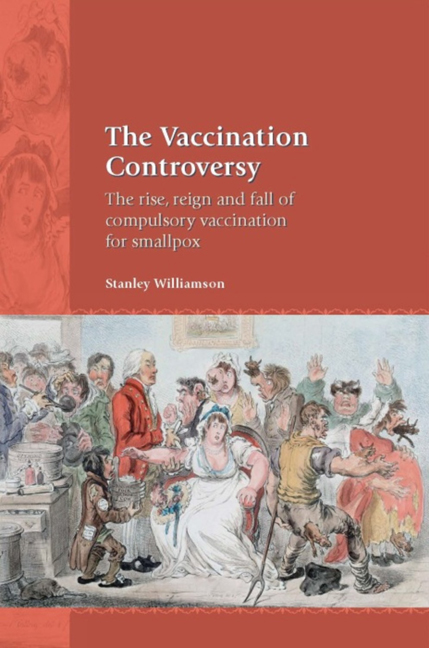Book contents
- Frontmatter
- Dedication
- Epigraph
- Contents
- Acknowledgements
- Part I The Road to Compulsion
- 1 The Byzantine Operation
- 2 The Small Pockes
- 3 The Engrafted Distemper
- 4 The Language of Figures
- 5 The Suttonian System
- 6 The Great Benefactor
- 7 The Speckled Monster
- 8 The Three Bashaws
- 9 A Competent and Energetic Officer
- 10 Formidable Men
- 11 The Present Non-System
- 12 Toties Quoties
- 13 Crotchety People
- Part II The Reign of Compulsion
- Part III The Retreat from Compulsion
- Notes
- Bibliography
- Index
5 - The Suttonian System
from Part I - The Road to Compulsion
- Frontmatter
- Dedication
- Epigraph
- Contents
- Acknowledgements
- Part I The Road to Compulsion
- 1 The Byzantine Operation
- 2 The Small Pockes
- 3 The Engrafted Distemper
- 4 The Language of Figures
- 5 The Suttonian System
- 6 The Great Benefactor
- 7 The Speckled Monster
- 8 The Three Bashaws
- 9 A Competent and Energetic Officer
- 10 Formidable Men
- 11 The Present Non-System
- 12 Toties Quoties
- 13 Crotchety People
- Part II The Reign of Compulsion
- Part III The Retreat from Compulsion
- Notes
- Bibliography
- Index
Summary
If the language of eighteenth-century figures is to be relied on, a surprising state of affairs is revealed. By the end of the third decade the contentious novelty inoculation had virtually died out, while the number of deaths from smallpox, as recorded in the London bills of mortality, remained at a steady level. Why had inoculation fallen out of favour? In 1749 the physician Frewen looked back over its vicissitudes during the period:
it is wonderful with how great an expectation it was received, with how much industry it was cultivated, and how soon it became incredibly famous […] Yet, notwithstanding, it made but a slow progress for several years, as gaining but little credit among the common sort of people, who began to dispute among themselves about the lawfulness of propagating disease and whether or no the small-pox produced by inoculation would be a certain security against taking it again by infection, and also whether other diseases or morbid contaminations of the blood might not be likely to be engrafted along with it.
These questions, Frewen commented, had been answered long ago ‘to the satisfaction of men of learning and candour’, but not, as he avoided saying, to that of the common sort of people, mainly because they were neither consulted nor offered the opportunity to try out the new discovery for themselves. Access to inoculation was and remained for many years the expensive privilege of the well-off, with the corollary pointed out in the early days of controversy by Isaac Massey, apothecary and uncle of the Revd Edmund, in a scornful dismissal of Jurin's conclusions concerning the relative dangers of natural smallpox and the inoculated variety. Those inoculated were, in accordance with Jurin's advice to medical practitioners, selected almost exclusively from the healthy, well-cared-for children of the upper classes, with all the implied built-in statistical bias. ‘He forgets,’ Massey complained, ‘that the inoculated are picked lives. If that's fair: Hang fair!’
Several treatises published towards the middle of the century, when inoculation was recovering from a decade of unpopularity, showed how far in this, as in so much else, the faculty had found ways of improving on the system thought to be adequate by the old Greek women of Constantinople. The operation, in so far as it was carried out at all, had become a time-consuming and costly business.
- Type
- Chapter
- Information
- The Vaccination ControversyThe Rise, Reign and Fall of Compulsory Vaccination for Smallpox, pp. 48 - 73Publisher: Liverpool University PressPrint publication year: 2007



